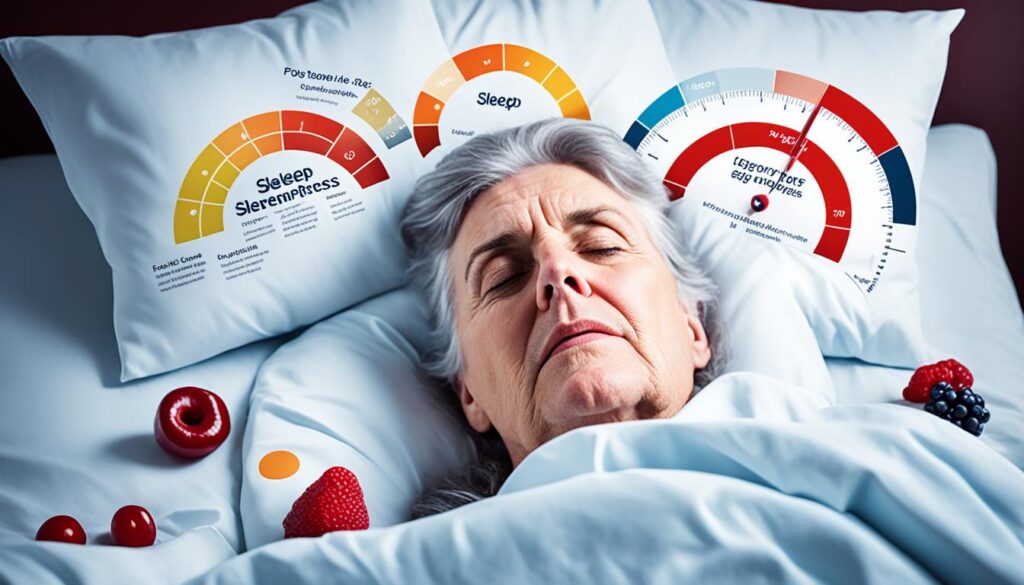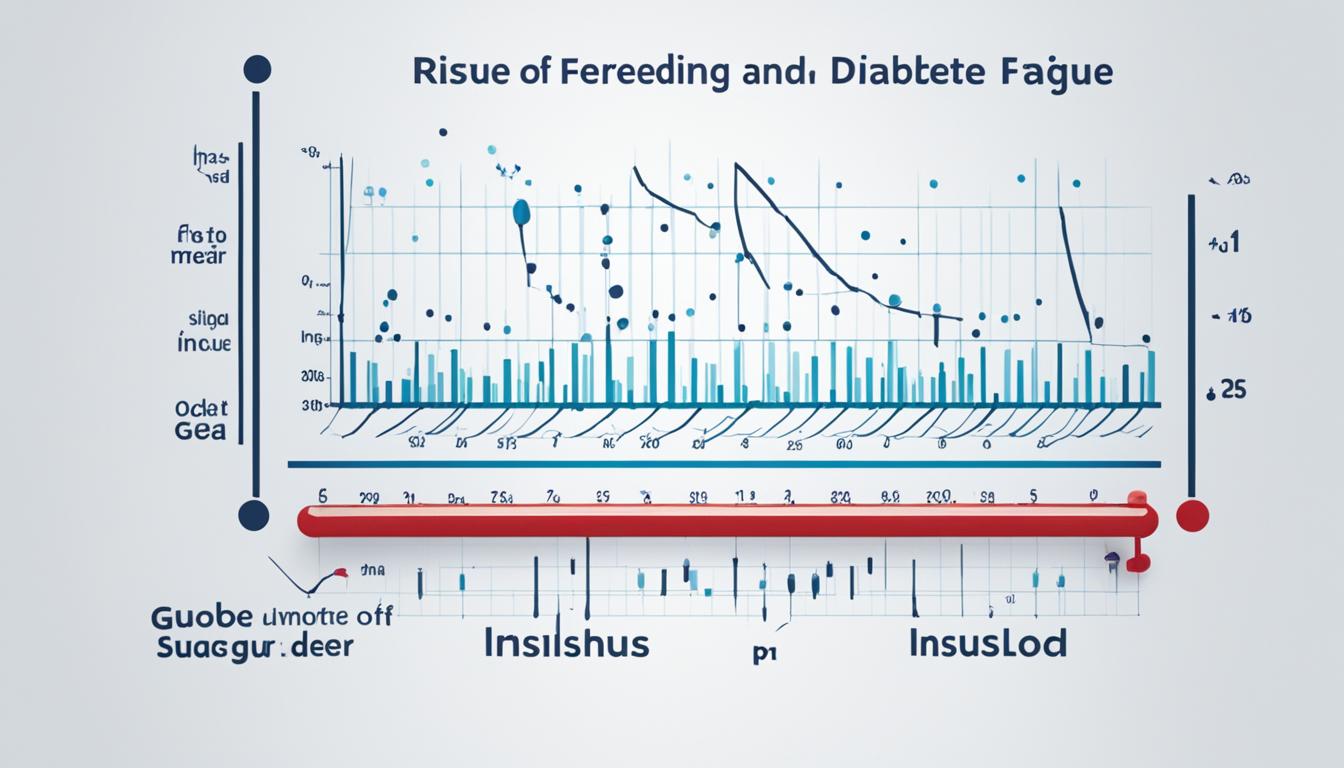“As an Amazon Associate I earn from qualifying purchases.” .
After a good meal, it’s normal to feel sleepy and eye the couch for a nap. This feeling of wanting to sleep after eating is common. But, it can sometimes warn us about diabetes risk. The urge to nap following a meal might signal health issues like diabetes.
Our bodies send subtle hints that we often miss. If you find yourself often sleepy after meals, it’s time to pay attention. The relation between your meals and energy levels is important for your health. Understanding how post-meal sleepiness links to diabetes risk is crucial for protecting your well-being.
Key Takeaways
- Understanding the distinction between normal post-meal sleepiness and signs of health issues.
- Identifying patterns of drowsiness and diabetes risk after meals.
- Recognizing the connection between falling asleep after eating and potential diabetes symptoms.
- Being aware of how dietary choices can impact your risk of diabetes.
- Valuing the importance of recognizing early signs of diabetes for better health management.
Understanding Postprandial Somnolence and Overall Well-being
Ever felt the need to nap after eating a big meal? You’re experiencing postprandial somnolence, a common condition. It can make us feel slightly tired or even very sluggish. Knowing how food affects our energy is key to staying healthy.
What is Postprandial Somnolence?
After eating a lot, you might feel sleepy. This is postprandial somnolence. When we eat, our bodies focus on digestion, making us feel tired. This sleepiness is normal and usually doesn’t last long.
Normal Vs. Concerning Sleepiness After Meals
Feeling a little sleepy after eating is normal. But if you’re too tired to do anything, it might be a problem. This kind of tiredness shouldn’t be ignored because it could point to a health issue.
Impact of Diet on Energy Levels
The food we eat affects how tired we feel afterward. Eating lots of carbs or sugar can make you feel more tired. Eating a balanced diet with fiber and protein helps keep your energy up.
| Food Type | Energy Impact | Sleepiness Level |
|---|---|---|
| High-carbohydrate | Quick surge, then drop | Higher |
| Protein-rich | Steady supply | Lower |
| Fiber-rich | Gradual release | Lower |
| Processed/Sugary | Rapid spike, quick fall | Higher |
Knowing how diet affects energy levels is crucial. It prevents tiredness and helps spot when sleepiness is more serious. Understanding this can guide us to healthier eating habits and better energy management.
Is Falling Asleep After Eating a Sign of Diabetes
Have you ever found yourself nodding off after a hearty meal? Feeling drowsy after eating is common. But, falling asleep after eating may raise health concerns. It could hint at diabetes, especially with diabetes symptoms like extreme thirst or peeing a lot. If you often feel very sleepy, it’s time to think about diabetes diagnosis.
Diabetes signs can appear slowly. The link between feeling tired after eating and blood sugar may not be clear at first. Here’s how your body may be signaling something’s wrong.
Excessive sleepiness, especially after meals, should not be ignored, as it may indicate a deeper health issue like diabetes.
Spotting diabetes symptoms early is key to control it. Here’s a list of symptoms other than tiredness after meals:
| Diabetes Symptoms | Descriptions | Related to Excessive Sleepiness |
|---|---|---|
| Increased Thirst | Feeling unusually thirsty despite normal fluid intake | Can exacerbate feelings of fatigue |
| Frequent Urination | Needing to urinate more often than usual, especially at night | Sleep disruption can lead to tiredness |
| Weight Loss | Unexpected weight loss without changes in diet or exercise | Energy deficit can cause sleepiness |
| Blurred Vision | Difficulty seeing clearly can occur with high blood sugar levels | May not be directly related to sleepiness but is a common concurrent symptom |
If you’re often falling asleep after eating and have other symptoms, see a doctor. A true diabetes diagnosis needs tests and not just symptom checks.
Your doctor can find out if your sleepiness after meals is due to diabetes or something else. Dealing with it early can improve your health. So, if you find you’re always sleepy after eating, look into it with a professional.
Exploring the Glycemic Impact on Sleep Patterns
Understanding the glycemic impact of what we eat can change our energy and sleep. Foods high in glycemic indices spike our blood sugar levels, then drop them fast. This can mess up your sleep patterns and sleep quality. By choosing what we eat wisely, we can sleep better every night. Let’s see how food and sleep affect each other.

Remember, while occasional indulgences are part of life, consistent glucose control contributes to sustained energy levels and improved sleep quality.
Wondering how food affects your sleep? Here are some common foods and their effects on blood sugar and sleep:
| Food Type | Glycemic Impact | Effect on Blood Sugar Levels | Effect on Sleep Patterns |
|---|---|---|---|
| High Glycemic Foods | Immediate, high impact | Rapid increase followed by decrease | Can disrupt sleep quality, induce wakefulness at night |
| Low Glycemic Foods | Slow, gradual impact | Steady, sustained release of glucose | Supports consistent energy, promotes restful sleep |
Choosing what and when we eat improves sleep hygiene. Do post-dinner sleepiness or morning tiredness bother you? Try eating fewer high glycemic foods for better sleep quality and glucose control. This is crucial for people watching their blood sugar levels.
- Consider introducing more low glycemic foods into your dinner.
- Monitor your body’s response to different foods by keeping a sleep diary.
- Pay attention to portion sizes to avoid overloading your digestive system before bedtime.
Every meal is a chance to feed your body right and improve your sleep. A balanced diet means energized days and peaceful nights. Make sure the glycemic impact of your meals helps you reach your wellness goals.
Recognizing the Symptoms of Diabetes Beyond Drowsiness
When we discuss diabetes, we often think of being very tired during the day. But it’s important to know about other signs too. There are various symptoms that could indicate diabetes. Knowing them helps us understand if diabetes might be the problem.
Common Diabetes Indicators to Watch For
Knowing the common signs of diabetes is crucial for early diagnosis. Thirstier than usual and going to the bathroom a lot are clear signs. Unexpected weight loss is another clue, as the body can’t use sugar right. Feeling tired all the time and having blurred vision are also signs of changing sugar levels in the blood.
How Excessive Daytime Sleepiness Fits into the Picture
Feeling overly sleepy during the day is a big hint that your sugar levels might be off. This tiredness, along with other symptoms, means you should check your health. It helps you act fast to manage diabetes.
| Symptoms of Diabetes | What to Look Out For | Possible Explanations |
|---|---|---|
| Excessive Thirst | Feeling parched despite adequate water intake | Your body is possibly expelling excess glucose through increased urination. |
| Frequent Urination | Visiting the bathroom much more often | Your kidneys are working harder to clear glucose from the bloodstream. |
| Unexplained Weight Loss | Losing weight without changes to diet or exercise routine | Your body may be burning muscle and fat for energy instead of glucose. |
| Blurred Vision | Difficulty in focusing on objects or reading text | High glucose levels are causing swelling in the lens of the eye. |
| Diabetes and Fatigue | Constantly feeling tired and lethargic | Your body cannot convert glucose into energy efficiently, leading to fatigue. |
Staying alert to these signs is critical. Early steps can greatly help in handling diabetes.
Insulin Resistance and its Effect on Post-Meal Sleepiness
Feeling the need to nap after eating is common. This is called post-meal sleepiness. It might seem okay but could point to insulin resistance. Insulin resistance is when the body can’t properly use insulin. This is key in managing blood sugar levels. Poor insulin function means glucose builds up in the blood, raising diabetes risk.
So, how does insulin resistance make you sleepy after eating? If your cells fight insulin, they won’t take in glucose well. This leaves too much sugar in your blood. Your body works extra hard against this imbalance. This can make you feel very energetic, then suddenly very tired.
It’s key to know the difference between normal tiredness after eating and the sleepiness from insulin resistance. Here are signs your sleepiness after eating might be due to insulin resistance:
- Feeling sleepy after every meal, no matter what you ate
- Wanting sweets or carbs after eating
- Being tired all day, not just after meals
Below, we look at how blood glucose changes for most people versus those with insulin resistance. This helps understand how it affects your energy and health:
| Time After Meal | Typical Blood Glucose Response | Insulin Resistant Blood Glucose Response |
|---|---|---|
| 0-1 hour | Moderate rise in glucose | Sharp increase in glucose |
| 1-2 hours | Peak glucose, beginning to normalize | Extended peak, slow to normalize |
| 2-3 hours | Glucose levels returning to baseline | Glucose levels remain elevated |
| 3+ hours | Stable glucose, energy levels normalized | Possible hypoglycemia, feeling of fatigue or sleepiness |
Insulin resistance takes time to develop. It’s linked to diet, lifestyle, and genetics. Luckily, early detection and changes in lifestyle can help. Changing your diet and getting more exercise can increase your insulin sensitivity. This can improve your health.
If you often feel sleepy after meals, talk to a doctor. They can see if insulin resistance is causing your symptoms. They’ll help you control your blood sugar better for good health.
The Role of the Gut Microbiome in Sleep and Digestion
The gut microbiome might not be your first thought for wellbeing. Yet, it’s key for your sleep and digestion. It affects how you feel post-meal. Learning about your body’s response to food means exploring these gut inhabitants.
Think of your gut’s good bacteria as a factory crew. They break down food and talk to your brain with chemicals. This can change your energy levels and mood. A balanced gut means better digestion and sleep. So, it’s vital to keep your gut healthy.
Understanding Your Body’s Unique Response to Food
Your meals affect your gut microbiome deeply. Eating foods full of fiber, prebiotics, and probiotics boosts good bacteria. This helps your digestion and sleep. Noting how foods impact you can lead to a custom diet. This diet will promote a balanced microbiome.
How Good Bacteria Can Affect Energy Levels
The good bacteria in your gut do more than digest food. They create substances with body-wide effects. For instance, some bacteria make short-chain fatty acids. These can change how your body uses energy. This influences your energy and alertness all day.
| Factors | Influence on Sleep | Influence on Digestion |
|---|---|---|
| Dietary Fiber | Promotes longer, more restorative sleep | Enhances growth of good bacteria |
| Prebiotics | Improves sleep quality after stress | Stimulates beneficial bacteria |
| Probiotics | May help in reducing sleep disturbances | Improves nutrient absorption |
| Processed Foods | Can disrupt sleep cycles | May harm beneficial bacteria balance |
Knowing how your diet, gut bacteria, and feelings connect is empowering. A healthy microbiome supports better digestion, sleep, and energy. It means enjoying calm days and restful nights.

Strategies to Manage Post-Meal Tiredness
Fighting the slump after eating is manageable. Adding a few smart habits to your mealtime helps you manage post-meal tiredness effectively. The choices you make about what to eat, how much, and when can deeply affect your daily energy.
Choosing the Right Foods for Balanced Energy
Choosing the right foods is key to avoiding post-meal fatigue. Pick foods that release energy slowly. This includes complex carbohydrates like whole grains, beans, and vegetables. They digest slowly, helping avoid sudden energy drops.
Include healthy fats from avocados and nuts, and quality proteins. These can help keep your blood sugar stable, fighting off sleepiness.
Importance of Portion Sizes and Meal Timing
How much you eat affects how you feel later. Eating too much can make you feel bloated and tired. Using smaller plates helps control your portions effortlessly. Meal timing also matters for keeping energy up.
Eating in line with your body’s clock helps avoid energy dips. For example, a light dinner early in the evening improves sleep and reduces next-day fatigue.
Being mindful about food and timing can boost your energy all day. Choosing the right foods, eating just enough, and sticking to a schedule helps maintain your energy. This leads to a healthier relationship with food and better daily vitality.
Tips for Regulating Glucose Postprandial Levels
Learning how to control glucose levels after eating is key to avoiding the tiredness that comes after meals. This can also decrease your chances of developing diabetes. Let’s look at useful ways to keep your postprandial glucose steady. This helps keep your energy levels balanced all day.
Complex Carbohydrates Vs. Simple Sugars
Making the right choice between complex carbohydrates and simple sugars is crucial for managing blood sugar after eating. Simple sugars are in things like sodas and candy. They quickly raise your blood sugar, giving you a short boost of energy but then you crash. On the other hand, complex carbs are in foods like whole grains and legumes. They digest slowly, providing a steadier energy release.
| Complex Carbohydrates | Simple Sugars |
|---|---|
| Oats | Candy |
| Brown rice | Soda |
| Quinoa | Pastries |
| Lentils | Syrup |
Keeping a Food and Symptom Diary
It’s also vital to maintain a food diary. This diary helps you spot trends in how you feel and see which foods help maintain alertness after meals. Record what you eat and track your feelings afterwards. The diary is useful for monitoring how your body handles sugar. You should note times you feel drowsy. This helps you adjust your diet.
- Log each meal’s contents, including snack times.
- Record any feelings of fatigue or energy after eating.
- Monitor symptoms that may hint at a blood sugar spike or drop.
By following these dietary tips and coupling them with regular exercise and a balanced lifestyle, you can better manage your postprandial glucose. This approach prevents the sleepiness that often follows meals. It’s about being more aware and making healthier choices, not perfection. This leads to better overall health.
Conclusion
As we conclude our look into why we feel sleepy after eating, it’s clear this feeling is usually harmless. However, it can signal diabetes if it happens too much. The link between your diet, insulin resistance, and gut health affects this sleepiness. Paying attention to how you feel after meals can help you decide if it’s a normal dip in energy or a warning for health changes.
Starting to manage diabetes risks means more than watching blood sugar. You need a full plan for your health. This includes choosing meals that keep your energy stable and eating on a regular schedule. Keeping an eye on your blood sugar after meals can fight off sleepiness and protect against diabetes.
Keeping healthy is a continuous effort that requires smart eating and knowing your body’s signals. If diabetes threatens, spotting it early and getting help can stop it in its tracks and improve your health. Make sure to talk to doctors for advice on the best diet and lifestyle for you, keeping you feeling your best.
FAQ
What is postprandial somnolence?
How can I differentiate between normal and concerning sleepiness after meals?
How does diet impact energy levels and post-meal sleepiness?
Is falling asleep after eating a sign of diabetes?
How does the glycemic impact of food affect sleep patterns?
What are the common indicators of diabetes to watch for?
How does excessive daytime sleepiness fit into the picture of diabetes symptoms?
How does insulin resistance affect post-meal sleepiness?
What is the role of the gut microbiome in sleep and digestion?
What strategies can I use to manage post-meal tiredness?
How can I regulate glucose postprandial levels?
Source Links
- https://zoe.com/learn/feeling-tired-after-eating-and-diabetes
- https://www.healthline.com/health/food-nutrition/why-do-i-feel-tired-after-eating
- https://www.circufiber.com/blogs/diabetes-resources/is-falling-asleep-after-eating-a-sign-of-diabetes
“As an Amazon Associate I earn from qualifying purchases.” .



